| CASE SUMMARY | Zodiac LETTERS | Zodiac REFERENCE MATERIAL: Police Reports, Photos, and More | Zodiac RADIO & TV | The ACCUSERS & The ACCUSED |
| GRAYSMITH UNMASKED | Zodiac Killer MYTHS & LEGENDS | ABOUT THIS SITE / SOURCES & LINKS | NEW! Zodiac Killer Forum | BLOG |
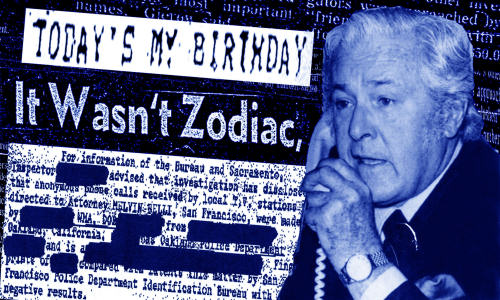
| Fact vs. Fincher | The "Silencer" Myth | Belli "Birthday" Call Myth | Darlene Ferrin MYTHS | The Myth of Bungling Cops |
Melvin Belli, the "Birthday" Call and The Zodiac
On the night of October 11, 1969, the Zodiac murdered cabdriver Paul Stine and removed a portion of the victim's shirt. Days later, the killer mailed an envelope to the offices of The San Francisco Chronicle. Inside, the Zodiac had included a blood-soaked piece of Stine's shirt along with a letter that traumatized the Bay Area for decades. In his customary cavalier style, The Zodiac wrote, "School children make nice targets. I think I shall wipe out a school bus some morning just shoot out the frunt tire and pick off the kiddies as they come bouncing out."
The Zodiac's threat to assassinate school children terrified children and parents everywhere, and created a nightmare of security concerns for police and school officials. Armed men escorted children to and from schools while patrol cars and even aircraft followed along and monitored the surrounding area. As media coverage of Zodiac's murderous plans increased and fears of a horrific ambush grew, a local television station was the setting for a chilling scene.
In the early morning hours of October 22, 1969, the Oakland police department received a phone call from a man claiming to be the Zodiac. The caller said he wanted famous Boston attorney F. Lee Bailey to appear on a local television talk show, but told the operator that he would settle for San Francisco lawyer Melvin Belli in the event Bailey was unable to appear.
Hours later, Belli was the guest on the show with host Jim Dunbar. A man called the KGO television station several times, and, in conversation with Belli, claimed he was the Zodiac and that his name was “Sam.” One exchange revealed that Sam had been interested in Belli for some time.
DUNBAR: Talk to us. Just, tell us what’s going on, inside you, right now. Please.
CALLER: I have headaches.
DUNBAR: Right.
BELLI: How long have you had those headaches, uh, Sam? Been a long time?
CALLER: Since I killed a kid.
BELLI: Well, was it before December that you had the headaches?
CALLER: (pause) Yes.
BELLI: If, did, were you in service, that you might have had an injury in service, did you ever fall out of a tree or down stairs? Were you ever unconscious?
CALLER: (pause) I don’t know.
BELLI: You don’t remember. Does aspirin do you any good?
CALLER: No.
BELLI: Doesn’t do you any good?
CALLER: No.
DUNBAR: Sam –
BELLI: Damn stuff never did me any good either.
DUNBAR: - Sam, let me ask you a question. Did you, um, did you attempt to call this program one other time when Mr. Belli was with us? And, you called -
CALLER: What?
DUNBAR: Did you try to call us one other time about, oh, two or three weeks ago when Mel Belli was with us?
CALLER: Yes.
DUNBAR: And you, uh, well –
BELLI: You couldn’t get through, and we were talking?
DUNBAR: And you couldn’t get through, the phones were tied up, is that it?
CALLER: Yes.
BELLI: Sam, let me ask you this – There’s some reason why you go to a particular doctor or a particular priest, and some reason why apparently you wanted to talk to me, or Lee? Is it that you feel we have compassion for people who get in trouble? Or, is that you feel that we can do something for you? Or is that you feel we’re, we’re, have enough integrity that if we promise you something, that we’re gonna stick to it?
DUNBAR: Well, let’s find out why he wanted to talk to – Why did you want to talk to Mr. Belli, Sam?
CALLER: I don’t want to be hurt.
At one point during the exchange, the caller threatened, “I’m gonna kill those kids!” Belli persuaded Sam to meet with him in person, but, due to the media circus surrounding the secret meeting, no one was surprised when Sam failed to appear at the agreed upon location. Efforts to trace Sam’s calls to the KGO switchboard were unsuccessful. A surviving victim and two police dispatchers had all spoken with the real Zodiac and, after listening to audio tapes of the caller’s voice, all agreed “Sam” was an imposter.
In the weeks after his televised phone conversations with “Sam,” Melvin Belli worked with rock legends The Rolling Stones as they attempted to find a concert venue somewhere in San Francisco. Belli worked as mediator between The Stones and Dick Carter, the owner of the Altamont Speedway. (These conversations and other footage featuring Belli with the famous band members can be seen in the film GIMME SHELTER.)
On December 6, 1969, crowds gathered at the site of the concert at the Altamont Speedway. Melvin Belli arrived and made his way through the mass of spectators. The infamous motorcycle gang The Hells Angeles served as security, reportedly in exchange for large quantities of beer, and gang members were involved in various hostile and violent incidents with fans throughout the concert. Fans were shocked when Alan Passaro, a 21 year-old Hells Angel, stabbed a man as the band played on.
When the man died, the brutal stabbing quickly became a media nightmare for The Rolling Stones, and a serious legal problem for The Hells Angels. The concert had been recorded on film as part of the upcoming movie, GIMME SHELTER, and the film revealed that the victim had pointed a gun at lead singer Mick Jagger before the Hell’s Angel intervened.
A few days after the December 6 concert, the district attorney called the owner of the Altamont Speedway and informed him that the he and the Hell’s Angels would face charges in the killing of the gunman. The owner then called members of the Hell’s Angels in an attempt to locate the missing gun used by the victim. The owner hoped the gun and the concert footage would prove that Alan Passaro had acted to protect Jagger and others from the gunman and, therefore, should not face charges.
Once the Angels located the weapon, the Altamont owner contacted attorney Melvin Belli, who had helped the Rolling Stones arrange the concert at the speedway. Belli told the owner to put the gun in a shoebox and bring it to his office. The owner followed Belli’s instructions and took the weapon to Belli’s San Francisco office. While Belli was able to help the gang members temporarily avoid prosecution, the district attorney later filed first-degree murder charges against Alan Passaro. (A jury acquitted Passaro in January 1971, and stated that he had acted in self-defense.)
Melvin Belli left San Francisco on December 20, 1969, to attend a conference of military trial lawyers held in Munich, Germany. On that same day, the Zodiac mailed a letter to Belli’s home. Postmarked December 20, the envelope arrived at the attorney’s residence on December 23. Belli’s housekeeper then forwarded the envelope to the attorney’s office. After the Christmas holiday, office employees opened the envelope and found it contained a written plea for help and a blood stained scrap of cloth. Belli’s staff immediately notified the San Francisco Police department.
Handwriting experts concluded that the Zodiac had written the letter, and police confirmed that the scrap of cloth did, in fact, come from the shirt worn by the Zodiac’s last known victim, cabdriver Paul Stine.
Paul Avery, reporter for the San Francisco Chronicle contacted Melvin Belli by phone in Munich, Germany on December 28. Belli commented on the Zodiac letter and offered his help to the Zodiac. Avery’s article (see photos below) appeared in The San Francisco Chronicle on December 29, 1969, and specifically stated that Belli was “en route to Germany” on the day the letter had been postmarked – December 20, 1969. Avery also mentioned that the housekeeper had forwarded the letter. Belli described his travel plans to Avery, who wrote, “Belli said he is scheduled to remain in Europe for several weeks – he has a trial starting next week in Naples, and then plans to fly to Algiers (Africa) to confer with fugitive Black Panther Eldridge Cleaver …”
On January 14, 1970, SFPD Inspector William Armstrong contacted the FBI to report that someone claiming to be the Zodiac had called the home of Melvin Belli and asked to speak with the famous lawyer. (see photo of this report below) The report read:
1 14 70 RE: SAN FRANCISCO AIRTEL DECEMBER TWENTY NINE LAST. On instant date Insp. (name redacted), Homicide Detail, San Francisco Police Department, confidentially advised that UNSUB, who identified himself as ‘Zodiac,' telephonically contacted attorney Melvin Belli's residence in effort to contact Belli. UNSUB was advised Belli was in Europe and stated, ‘I can't wait. Today's my birthday.'
This report was marked “URGENT” and directed to the “Identification Bureau.”
According to the report, San Francisco police requested that the FBI “re-check” the fingerprints of a suspect who had previously been reported to the Bureau, suggesting that the birth date of the caller was the same as the date the call had been made. The name, and birth date of the suspect, were redacted before the report was released to the public, leading to speculation regarding the actual date of the call. The first line of the report read, "RE: SAN FRANCISCO AIRTEL DECEMBER TWENTY NINE LAST," and has been misinterpreted as the date that San Francisco police notified the FBI regarding the "birthday" call. Each FBI report includes the date of the last report referencing the same subject matter. On December 29, San Francisco police contacted the FBI to report the Zodiac's most recent attempts to contact Melvin Belli by mail. Per FBI procedure, the next report to reference the Zodiac's possible attempts to contact Belli cited the most recent report on the subject.
The report stated that the FBI was contacted by San Francisco police “On instant date.” This term is used in official documents to quickly and clearly denote the current date, time, or subject - in short, “instant date” translates to today’s date. As the report is dated January 14, 1970, logic dictates that the "birthday call" took place on or shortly before January 14, 1970.
FBI files indicate that police were quick to report developments to the FBI. The SFPD sent dozens of requests to the FBI for assistance in the investigation, including fingerprint and handwriting comparisons, checks for criminal records, identifications of suspects, suspect information, examination of coded messages, and more, including simple memos to correct the spelling of a suspect’s name. In one instance, police requested copies of the fingerprints belonging to a potential suspect and arranged with the FBI for the evidence to be flown from Washington to California on the same day the request was submitted.
The “birthday” call inspired police to set up a trace on Belli’s home phone in the hopes that future calls from “The Zodiac” would lead to his location and identity. On February 18, 1970, Inspector Armstrong contacted the FBI to report that the individual who had been calling Belli at the television station had been identified and located. The calls had been placed from a mental institution, and the caller, who had used the names “Sam” and “The Zodiac,” was actually a patient named Eric Weil.
An amateur photographer, Eric Weil lived in the Bay Area during the 1960s. "By all accounts, Eric was just one of those guys who showed up everywhere with a camera," wrote a former acquaintance. "My efforts to track down Eric were unsuccessful. One person I interviewed was pretty sure Eric ended up doing time in prison not long afterwards."
On December 3, 1965, songwriter and rock legend Bob Dylan appeared at a press conference held in the studio of San Francisco television station KQED and hosted by the music lover, Ralph J. Gleason. Eric Weil attended the conference and took photographs with a Polaroid camera throughout the event. As the conference began, Weil had an odd question for Dylan.
GLEASON: Who’s first? Come on.
WEIL: I’d like to know about the cover of your, of your forthcoming, or your, uh, uh, album - the one with Subterranean Homesick Blues in it. I’d like to know about the, the meaning of the photograph with you and the wearing of the “Triumph” tee-shirt.
DYLAN: What did you want to know about it?
WEIL: Well, that, you know, that, that’s an equivalent photograph, it means something, it’s got a philosophy in it – (audience laughs; Dylan is amused) – and I’d like to know visually what it represents to you, because you’re a part of that.
DYLAN: (searching for an answer) I haven’t really looked at it that much, I don’t really –
WEIL: (emphatically) I’ve thought about it a great deal.
DYLAN: All right, it was just taken one day when I was sitting on the steps, you know. I don’t, uh, I don’t really remember, really, uh, too much about it.
WEIL: What about the motorcycle as an image in your, in your songwriting? You seem to like that.
DYLAN: Oh, well, we all like motorcycles, to some degree.
WEIL: (quietly) I do.
Weil's fascination with celebrity was evident during the 1965 press conference and during his 1969 telephone conversation with Melvin Belli on KGO television. Speaking as “Sam,” Weil admitted to TV host Jim Dunbar that he had previously attempted to call the television station during Belli’s appearance on the program several weeks earlier. Weil’s behavior indicated that he had become fixated with Belli, and that the calls to Belli’s home were part of his ongoing efforts to establish contact with the publicity-loving lawyer.
In his 1971 summary of the Zodiac case, reporter Paul Avery wrote that Eric Weil had been identified after calls to Belli’s home were traced to the mental hospital. In his 1975 book, GREAT CRIMES OF SAN FRANCISCO, San Francisco Chronicle reporter Duffy Jennings stated that police had been able to locate “Sam” after calls to Melvin Belli’s home were traced to the hospital in Oakland. Jennings wrote that police believed the imposter had been responsible for the calls to the television station as well as call to the Oakland police department in October. San Francisco investigators cleared Eric Weil as a Zodiac suspect.
The FBI report is the only official document to mention the so-called “Zodiac birthday call” to Belli’s residence. The call is not mentioned in any of the hundreds of pages of reports produced by the Vallejo police department, the Napa County Sheriff’s Office, the Department of Justice or the San Francisco police department. If authorities had any reason to suspect that the real Zodiac was responsible for the birthday call, the important information regarding the killer’s possible date of birth would most likely appear somewhere in the official files generated during the decades of investigation.
The fact that someone claiming to be the Zodiac had made such a call was not disclosed until 1999, when the FBI files regarding the Zodiac case were released to the public through the Freedom of Information Act.
Robert Graysmith’s 2002 book, ZODIAC UNMASKED, cited the FBI report and claimed that this call was made by the real Zodiac on the December 18 – the birthday of his chosen suspect, Arthur Leigh Allen. No one had ever attributed the “birthday” call to the real Zodiac until Graysmith did so in this book. Graysmith was also the first and only person to claim that the call had occurred on the birthday of his suspect.
Graysmith’s account of the call varies. On page 362 of ZODIAC UNMASKED, under the date "Thursday, December 18, 1969," Graysmith wrote, "Zodiac called the attorney's home, but got his housekeeper instead." Graysmith cited the lone FBI report, # 9 49911 88, dated January 14, 1970, as the source for his date of the call.
Under the date "Saturday, December 20, 1969," Graysmith wrote, "Two days after the call, exactly a year after the first Northern California murders, Zodiac's letter containing a square of Stine's bloody shirt arrived at Belli's home. Unopened, it was forwarded down to his business office to be opened by his secretary." On page 365, Graysmith wrote, "...December 20, a letter from Zodiac arrived at Belli's office."
Graysmith provided a quote from Belli on page 363 of ZODIAC UNMASKED. "On December 18, 1969, the Zodiac mailed me a brief note wishing me a happy Christmas. I went off to safari in Africa. But while I was there, the Zodiac, according to my housekeeper, phoned me several (more) times."
(Graysmith inserted the word, “more,” into Belli’s quote in order to imply that Belli had mentioned a previous call when, in fact, he did not do so.)
Belli dated the letter December 18 but did not provide the date of the phone calls. He stated that he was "off to safari in Africa" while the Zodiac was phoning his home. Belli’s timing of the event indicates that he did not leave San Francisco until after the Zodiac had mailed the letter on December 20, 1969. Belli’s statement, made long after the time in question, indicates he may have been confused about where he had traveled at the time, but his statement that he left after the Zodiac mailed the letter is consistent with the account of his travel plans provided to reporter Paul Avery.
Using the available information, the following timeline accounts for Belli’s whereabouts:
Dec 6 thru Dec 20 = San Francisco
December 20, 1969 = Belli departs for Europe
Dec 20 thru Dec 28 = Munich, Germany
Dec 28 thru Jan 2/3 = Munich, Germany
Jan 2/3 thru Jan 9/10 = Naples, Italy
Jan 9/10 thru Jan 14/on = Algiers, Africa
This rough estimate places Belli in San Francisco until December 20, when he departed for Europe. Belli remained in Europe until he left for Africa some time in the second or third week of January.
If Belli was correct, and the calls to his home were placed while he was in Africa, the calls took place some time in the second or third week of January of 1970. The only FBI report to mention this birthday call is dated January 14, 1970, or the end of the second week of January.
Graysmith wrote that Belli had returned to California after he had been in Naples. According to Belli’s statements, he was scheduled to be in Naples during the first week of January. Belli also said that the Zodiac calls had occurred after he had arrived in Africa. Belli was scheduled to be in Africa sometime during the second or third week of January. If Belli had returned to California he must have done so sometime in the middle of January before he traveled to Africa.
All of the available information indicates that the call occurred shortly before or on January 14, 1970. None of the available information indicates the call occurred on December 18, 1969.
Graysmith’s books served as the basis for a new film directed by David Fincher (Se7en). In the film, the so-called “Zodiac birthday call” serves as a lynchpin of Graysmith’s accusation that his suspect, Arthur Leigh Allen, was the Zodiac. Facts are changed and the sequence of events surrounding Belli are rearranged.
One curious scene shows Toschi and Armstrong arriving at the home of Melvin Belli while Christmas music plays. Inside, they find the melodramatic attorney sitting behind his desk and holding a new letter from the Zodiac. Belli reads the letter to the inspectors who are not happy with him. Belli says that the people have a right to know about the letter and Toschi says, “Which is why you contacted the Chronicle.”
Armstrong asks when the letter arrived and Belli says that the envelope came during “the middle of last week.” He believed that the Zodiac had chosen to write to his home because he had been unable to contact Belli at the TV station or “here.” Armstrong asks, “He tried to contact you here?” Belli responds, “Several times,” and explains, “I was out but he spoke with my housekeeper.” Armstrong then runs off to question the housekeeper.
The facts demonstrate that Belli was in Munich, Germany, and not in San Francisco, when the Zodiac’s letter arrived at this home on December 23, 1969. He was not at his home and did not touch the Zodiac letter, nor did he contact the Chronicle before alerting authorities. Belli did not tell police about phone calls to his home because no such calls had occurred at that time. The FBI files state that Belli’s housekeeper did not report receiving any phone calls from someone claiming to be the Zodiac at the time in question but several weeks later in January 1970.
Immediately after this scene of the film, a title on the screen reads, "March 22, 1970 - 2 1/2 Months Later." Approximately 2 1/2 months before March 22, 1970 would date the scene in Belli's home in the second week of January, or the time of the FBI report that mentions the "Zodiac birthday call."
In another scene, Graysmith sits in the home of Melvin Belli, waiting to meet with the famous attorney. Melvin’s housekeeper brings the cartoonist some refreshments while he moans about the length of his wait. He tells her that he is writing a book about the Zodiac case and the housekeeper says, “I talked to him.” Graysmith asks, “With Mr. Belli, about the case?” and the housekeeper replies, “With Zodiac, when he called.” She tells Graysmith that the caller had said it was his birthday.
When asked to recall the date of the phone call, the housekeeper says, “Mr. Belli was away for Christmas, gone for a week…then the letter arrived.” She further states that Belli “came back on Christmas.” Graysmith deduces, “So, the call came before December 20” and says to himself, “So, he (Belli) left on the 18th.”
Graysmith never interviewed Belli’s housekeeper, and he did not learn of this so-called “birthday” call until 1999 with the release of the FBI files on the Zodiac case. These files demonstrate that the phone calls to Belli’s home occurred in early 1970, and that these calls were traced to the patient in a mental hospital.
Belli did not leave for Europe on December 18, but on December 20, as he told reporter Paul Avery. Belli was not in San Francisco for Christmas as the housekeeper described in the film, but in Munich, Germany, as is well documented in press accounts of that time.
After the scene with Belli’s housekeeper, the film shows Graysmith as he breathlessly dials Toschi for confirmation on the “birthday” call. Toschi is evasive but then tells the cartoonist that, had his partner checked on the call, he would have to “put that in a report” for the Department of Justice.
Any reports Armstrong filed with the Department of Justice would have stated that the phone calls to Belli’s home were traced to a mental patient and were not made by the real Zodiac. Toschi therefore had no reason to tell Graysmith otherwise.
Graysmith is also shown speaking with Agent Mel Nicolai of the State Department of Justice in Sacramento, California. Nicolai states that none of the suspects had been born on December 18, the day Graysmith believes the “birthday” call took place. The agent says, “Armstrong checked this out.”
Had Armstrong "checked this out," he would have known that his own suspect, Arthur Leigh Allen, was born on December 18. Obtaining a suspect’s date of birth and other vital statistics is usually the first thing on an investigator’s list of things to do. None of the investigators seemed to notice this important fact, indicating that they knew that the “birthday” call did not take place on December 18, and they considered the call to be of little importance in the investigation.
Near the end of the film, Robert Graysmith appears at the home of SFPD Inspector David Toschi, proudly produces Arthur Leigh Allen’s drivers license, and cites the December 18 “birthday” call to attorney Melvin Belli. Toschi seems impressed by Graysmith’s discovery concerning Allen’s date of birth and the date of the “birthday” call. In reality, Toschi knew that the “birthday” call did not occur on December 18, and that the call was placed by a patient in a mental hospital, not the Zodiac.
In the final analysis, several conclusions are inescapable:
- The man who called the TV station on October 22 and spoke with Melvin Belli by phone was not the Zodiac, but Eric Weil.
- The real Zodiac mailed a letter to Belli’s home on December 20, 1969, the day that Belli departed for Europe.
- The letter was received several days later and the SFPD alerted the FBI on December 29.
- The media reported the story in late December while Belli was in Europe.
- The media attention provoked the TV caller to call Belli’s home some time in January of 1970.
- Belli’s housekeeper told the the caller that Belli was in Europe.
- The housekeeper contacted police to report the Zodiac call.
- Shortly after receiving this information, the SFPD alerted the FBI on January 14, 1970.
- SFPD then placed a tap on Belli’s phone and once the man called again, they were able to trace the call to a mental hospital and patient Eric Weil.
- On February 18, 1970, the SFPD informed the FBI that the matter had been resolved.
- The “birthday” call was forgotten because it was not made by the real Zodiac.
- The real Zodiac did not call Melvin Belli.
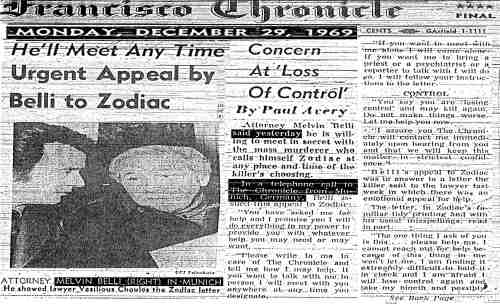 |
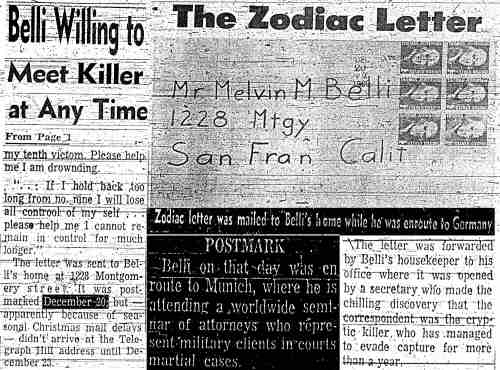 |
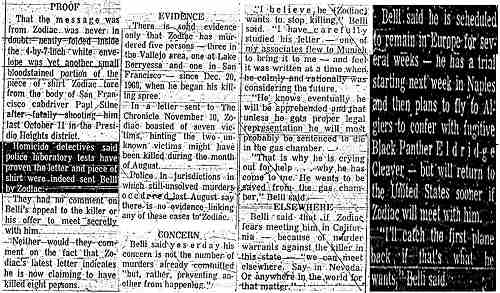 |
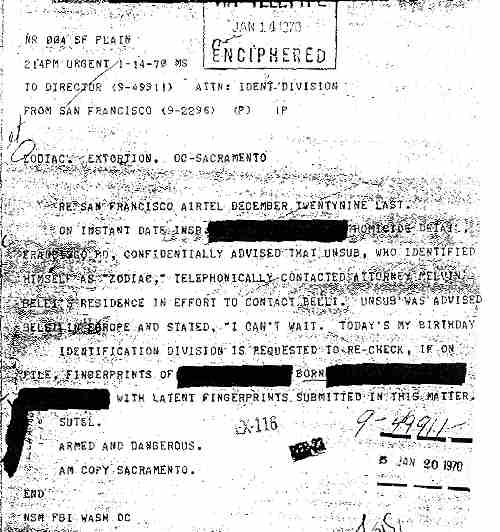 |
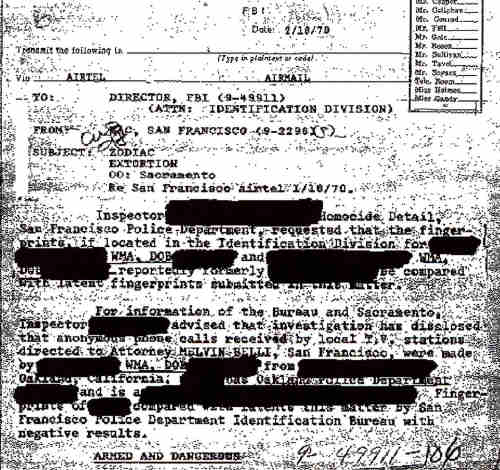 |
Darlene Ferrin, the Painting Party, and the Stalker
